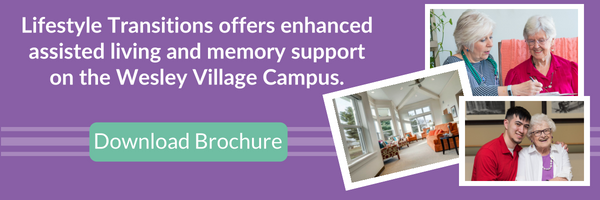Senior Memory Care Communities: What to Expect
memory care | lifestyle transitions
.jpg?width=300&name=Wesley-05242018-4010%20(2).jpg) You’re overwhelmed and Mom or Dad needs more care than you can provide them as their cognitive health declines. You’re worried for their safety and you’re beginning to think it’s time to get outside help. Does this sound like you?
You’re overwhelmed and Mom or Dad needs more care than you can provide them as their cognitive health declines. You’re worried for their safety and you’re beginning to think it’s time to get outside help. Does this sound like you?
It’s most likely time to start looking into senior care options, especially if your loved one has been diagnosed with Alzheimer’s disease or dementia.
According to the Alzheimer’s Association, by 2050, there will be nearly 14 million Americans living with Alzheimer’s disease. Because of this projected rise in numbers, there are more and more senior memory care communities popping up across the country. So, to your benefit, there are various options for you to explore and a lot to compare when searching for the perfect option for Mom or Dad.
As you start to explore your options, it’s imperative that you ask the right questions and learn as much as you can about each community because as you can imagine, the care of your loved one, especially someone with dementia, is not something you want to take lightly.
Here is a list of things to look for when finding a memory care community near you.
Staffing
One of the major benefits of memory care communities is that there are trained professionals around-the-clock available to assist your loved one with anything they need. In your average assisted living community, caregivers are only available as needed, whereas in enhanced assisted living communities like memory care, there are always caregivers available during the day and evening, meaning your loved one will receive assistance whenever needed. Most memory care communities abide by the Alzheimer’s Association protocol with a 8-to-1 staffing ratio (8 residents per 1 caregiver). While exploring your options, make sure you look into how many residents are under the care of the same nurses or CNAs, because if they have too many residents to take care of, the quality of care decreases.
Care
On the topic of care, it’s important your loved one gets both the physical and emotional care to match their needs. As mentioned previously, memory care communities have staff specially trained to serve seniors with memory impairments. As you talk with various communities, ask them how their program is unique in serving those with memory loss and even ask to meet some of the caregiving team that would be caring for your Mom or Dad.
Some memory support communities, like Lifestyle Transitions in Shelton, CT, offer tier levels of care. This means that as a resident’s care needs increase, you don’t have to worry about them being kicked out of the community. As their tier level increases, based on a nurse’s assessment, they will receive a higher level of care from the nursing team (more check-ins, more frequent escorts to activities or meals, more personal care in the AM and PM or incontinence management). It will cost more, but it means your loved one doesn’t have to worry about having to move out or hire private aids if their needs increase within the available scale.
Ask your community of interest how they handle increasing care needs and if they offer a tiered care package.
Physical Community
Making a move to a senior living community is a big deal! Most likely, your loved one will be leaving a home they have lived in for a long time. So, you’ll want to make sure the community your family chooses is as home-like and comfortable as possible. You’ll also want to make sure the community is optimized for someone with dementia or Alzheimer’s disease. For instance, you don’t want a huge community, as it could be very confusing for someone with memory impairment. You also, if possible, want to avoid communities that require residents to transition from floor to floor, as that’s a whole new confusing element for people with dementia. Ideally, the floorplan should be simple, easy to navigate and not too large.
Then, you have to decide; do you want your loved one in a fancy, shiny and hotel-like community or a more quaint one. Either are a possibility, depending on what your loved one prefers. Typically, the more home-like and comfortable the community is, the easier residents adjust.
It’s important to have gathering spaces, like a kitchen and living room, where residents can spend their time. Growing up, the kitchen was the place where everything happened (homework, meals, gatherings, conversations, etc.) so some memory support communities, like Lifestyle Transitions, put an emphasis on this space, as it brings back many wonderful memories for a lot of residents.
Additionally, most memory care communities have wander-guard systems in place in case your loved one has wandering tendencies. Enclosed courtyards are another nice feature of communities as they provide a safe way for residents to enjoy fresh air and outdoor activities.
Engagement and Social Opportunities
You want your loved one to feel safe, happy and engaged. This is why many memory care communities have a focus on purposeful living. Activities Directors are hired with the focus of engaging and involving residents in daily activities. From baking foods, going on out-trips to local restaurants, hosting barbecues or crafting, senior memory care communities have a full calendar of activities and outings. Of course, residents have the choice on whether or not they want to participate in something, but staff encourage involvement because a stimulated brain is a strong brain. Communities offer volunteer opportunities, groups and clubs and social gatherings to build friendships, encourage socialization and keep the mind healthy.
There is a lot to consider when looking at memory care communities but you now have a good idea of what to focus on during your search. Alzheimer’s is a discouraging disease but at a memory care community, your loved one can maximize their independence and live a fulfilling life.
Lifestyle Transitions, located on the Wesley Village senior living campus in Shelton, CT, offers enhanced assisted living in a secure, supportive environment for those living with memory loss. If interested in learning more about this innovative program, please call 203.225.5025 or download the brochure here.
About Chelsea Sayegh
I started working as a Marketing Coordinator for United Methodist Homes in October of 2016. I work on public relations, website management and community planning for their award winning independent and assisted living communities. As a graduate of Ursinus College with a degree in Media and Communications and a passion for serving nonprofits, United Methodist Homes has become my home away from home. I spend my days working in a community filled with smiling faces, helpful hands and wonderful residents. I have a passion for assisting seniors and take great pride in being able to promote a company with such a positive mission and values. As an individual committed to learning and growing, I have jumped right into this exciting career!

Our Blog is a 2016 Platinum Generations Award Winner! The Generations Award is an annual international competition for excellence in senior marketing recognizing professionals who have communicated to the 50+ Mature Markets.




